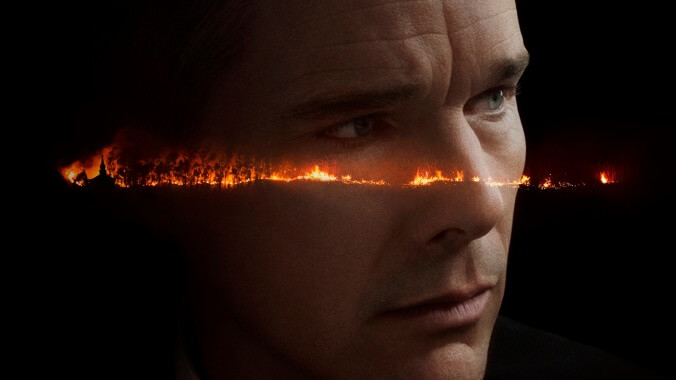Paul Schrader's transcendent, outrageous First Reformed gives Ethan Hawke one of his best roles

The title of First Reformed, Paul Schrader’s best film in a very long time, refers to an old abolitionist church in upstate New York, a metaphor for Christianity’s neglected values. The First Reformed has no congregation to speak of, only visitors and tourists, and its care has fallen into the hands of a lost soul, the gentle, hollow-cheeked Rev. Toller (Ethan Hawke, in one of his most moving performances). He is God’s clinically depressed man—a former military chaplain, an alcoholic haunted by his son’s death in the Iraq War, privately humiliated by the example of Christ and the stern Dutch ministers who once hid runaway slaves under the floorboards of this small clapboard church. With the First Reformed weeks away from a reconsecration that’s being underwritten by an energy conglomerate, and his mental and physical health deteriorating, he nonetheless commits to keeping a dark secret: he’s been asked to hide an explosive vest that was found in the garage of a disturbed local man. Call it Chekhov’s suicide bomb.
Schrader—who is best known for his screenplays for Martin Scorsese, but has also written and directed movies like American Gigolo, Mishima: A Life In Four Chapters, and Affliction—has never made anything as minimalist and contemplative as First Reformed, a film of empty spaces framed in boxy Academy ratio. And yet his grotesque sensibility informs every moment of this feature-length homage to Robert Bresson’s Diary Of A Country Priest and Ingmar Bergman’s Winter Light (it borrows plot points and visual ideas from both), an emotionally engaging contradiction in which the film draws parallels to the contradictions of faith. The writer-director is a portraitist of the self-destructive American psyche, and his subject matter here is something of an update of his landmark screenplay for Taxi Driver, with Toller pouring pink Pepto-Bismol like toxic sludge into a whiskey glass in a visual echo of Travis Bickle’s eerily fizzing Alka-Seltzer. Tending to his church in the dead of winter, the soft-spoken rector of the First Reformed quietly bears witness to the apathy of the world. In Schrader’s take on the modern digital age, the city rat’s violently fantasizing, alienated stare has been replaced with the late-night Googling of horrors.
The small miracle of First Reformed is that its outrageousness—which flirts with satire, symbolism, climate fears, and the stuff of cheap thrillers yet still finds room for a transcendently goofy psychedelic sequence—should come from a place of subtlety. Schrader writes faith patiently and sensitively, as a running conversation that continues from Toller’s narrated journal entries to the tours he leads for out-of-towners and schoolchildren at First Reformed to his meetings with Mary (Amanda Seyfried), a pregnant young woman whose environmentalist husband has lost faith in his own cause, and Rev. Jeffers (a superb Cedric The Entertainer), a gregarious, successful pastor who shares Toller’s worries about the future of Christianity. Schrader portrays Toller’s depression with a knowing insight into the way it can replace a depressed person’s sense of meaning, as private and metaphysical as prayer. An “all-consuming knowledge of the emptiness of all things” is what Toller calls it in his journal.
It’s possible that no ending could avoid shattering the film’s delicate balance of deliberation and anguish, which depends on the fine tuning of Hawke’s performance. He makes Toller a creature of soothing and despair; his love for his church and willingness to listen are as genuine as his innermost thoughts are angry and bleak. First Reformed’s final minutes are untidy, but in all of its exaggerations, the film persists in its seriousness about the survival of the soul in hard times and its portrait of a flawed man who can’t reconcile a troubled world with an uncompromising faith. The movie is as contradictory as its themes, and it’s unlikely that anyone beside Schrader, whose imagination has always been half arthouse and half grindhouse, could have made it.